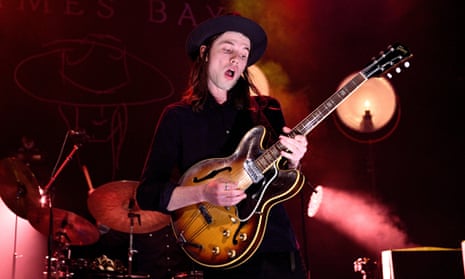Music fans tend to love an old soul in a young body, or at least a big voice coming out of a small frame. Last year, George Ezra was that oxymoron – a young troubadour with a Delta bluesman stuck inside his windpipe. Another sensation, Hozier, looked like a ragamuffin, but bellowed like a preacher.
The year before, cherub Tom Odell sang piano ballads with the world-weariness of a serial dumpee. Nearly a decade ago, James Morrison pulled off a similar double-take, while Scot Paolo Nutini has parlayed a career as a pretty pop star into something more grimacing – and even more successful.
Right now, it’s Hitchin-born, hat-wearing newcomer James Bay, 22, channelling the big, chewy vocals while still squeezing into girls’ black size eight jeggings (the likely source of his useful falsetto on songs like Let It Go).
He comes on stage at Koko – a gig he sold out three months ago – thumping and yearning, like 80s Bruce Springsteen channelled through Mumford & Sons. On Craving, Bay yearns for something bigger than the small-town scene that the song opens on. He is all in black, his long hair held in place by his signature hat – echoed in the line drawing of his hat and face first featured on his 2013 debut EP and now on his backdrop, branding so blatant it raises a chuckle.
There’s a band with Bay, foreshadowing his forthcoming debut album, Chaos and the Calm, due out next month, which beefs up what has been, until now, a singer-songwriter one-man-show with meatier arrangements. For When We Were on Fire, there’s now some organ and a lot of country-soul good times, considering the song is about dying love. The album was produced in Nashville by Jacquire King, who made his name behind the desk on a series of Kings of Leon albums, and it is no exaggeration to say that it makes Kings of Leon sound both highly original and emotionally complex.
Like every gig Bay has played in the UK since the latter half of last year, this one feels like a coronation. Couples sing along to the songs from his EPs; Bay’s chat is greeted with delirious whoops. “It took me two years to write this song,” says Bay, of fan favourite Scars, which he plays alone on guitar; it is about how his girlfriend moved to another country. Bay’s strangulated holler captures his turmoil. Live, he has a guitar for every mood: an acoustic; an electric, on which he can needle solos (one of Bay’s finer skills); and a semi-acoustic. Like hats, and black, guitars are his unique selling point. Bay recently declared a need for a guitar music renaissance to combat the surfeit of EDM and electronic pop, neglecting to note the existence of Jake Bugg or Ed Sheeran.
Bay has scooped up this year’s Critics’ Choice Brit award, a self-fulfilling prophecy that makes pop critics look less like seers and more like lazy staters of the obvious. Songs this honed and mainstream aim squarely for the mass solar plexus and do not miss. Bay has a slew of nagging, effective tunes that build to climaxes – like Best Fake Smile that seems to be advising a model to give up modelling. Elsewhere, Bay’s lyrics favour rivers, fire and running, the kind of imagery that doesn’t require much Googling.
Bay has everything going for him: chiselled looks, a gristly delivery honed through years of open mic nights, and a gamut of songs from the rootsy and rousing to the soulfully racked. There is no denying the catchiness of Hold Back the River, Bay’s best-known tune, one that closes his set with a wallop.
As destiny plays itself out tonight, though, it’s hard to see what all the fuss is about. While Bay is certainly likable, he exudes no palpable charisma, other than that aggregated by his signifiers – the hat, the black, the hair. No envelopes are being pushed here. At least George Ezra had the courtesy to add mischief to the formula, with songs about clocks and Budapest.
If a glance at the British music industry’s recent success stories teaches anything, it is that male balladeers have rarely had it so good. Sheeran and Sam Smith have both had Atlantic-straddling successes. Moreover, though, it teaches us that this sort of old-sounding music never, ever gets old – particularly if it is coming out of an unlined face.

Comments (…)
Sign in or create your Guardian account to join the discussion